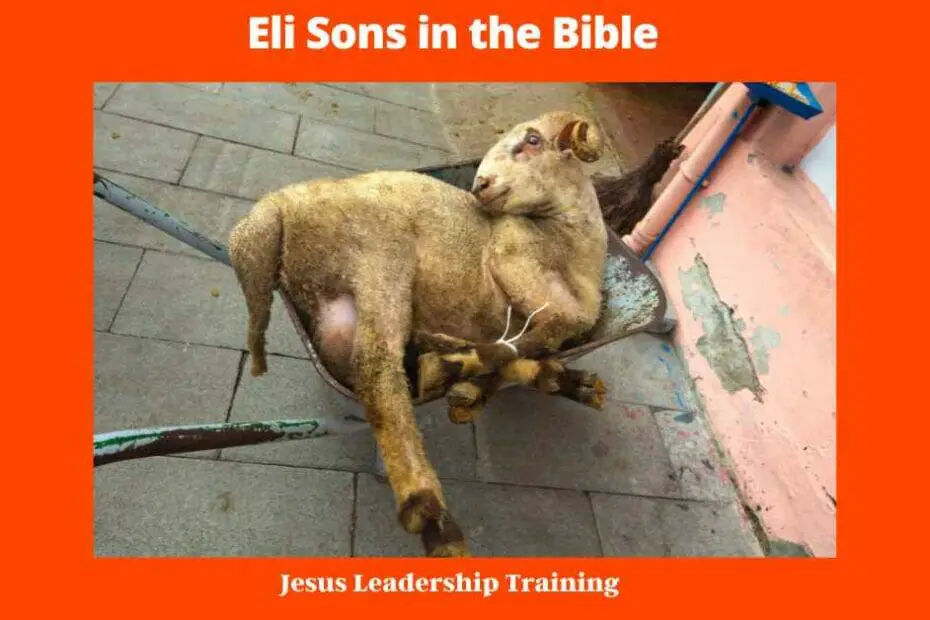Eli Sons in the Bible – Eli was a man who had two sons, both of whom were priests in Israel. Hophni and Phinehas were notorious for their wickedness and corruption. Eli’s sons were scoundrels; they had no regard for the Lord. · But Samuel was ministering before the Lord—a boy wearing a linen ephod. In fact, they were so bad that God eventually killed them both. Eli was a good man, but he didn’t discipline his sons enough, which led to their downfall. This is a cautionary tale that we should all learn from. If you have children, make sure you discipline them and teach them the right way to live!
Table of Contents
Eli Sons in the Bible
The story of Eli and his sons can be found in 1 Samuel chapters 2-4. Eli was a judge and the priest of Shiloh. He had two sons, Hophni and Phinehas, who were wicked men. They took advantage of their position as priests and committed sexual immorality with the women who came to the tabernacle to worship. They also demanded that the people give them the best cuts of meat, even though that was supposed to go to God.
Eli’s sons’ wickedness caused God’s wrath to fall on Eli and his family. God told Eli that because he had not disciplined his sons, they would die on the same day. And that’s exactly what happened. The Philistines attacked Israel and killed Hophni and Phinehas in battle.
When Eli heard the news, he fell over and died from a broken neck. Eli was at that time an old man, he was a faithful priest and a man of God. In his old age, his boys had evil ways at the tent of meeting. During those years the boy Samuel was Brought to him. Young Samuel was a young man and left for the house of Eli.
This is brought out clearly in the King James Version. KJV, in the account of the sins of his sons, in their service to God.
Eli was the high priest and judge of Israel
Eli served as both the high priest and judge of Israel. He was a faithful man who loved God and desired to serve Him fully. However, Eli made some mistakes that led to his downfall. In this blog post, we will examine Eli’s life and learn from both his successes and his failures.
He was a Godly Priest who served the tribes of Israel when they resided in the promised land. He had the Office of High Priest, his sons became sons of worthlessness. They sinned by sleeping with women at the door of the temple, they used a three-pronged fork in taking the best of the offering of the Lord.
Eli was born into the family line of Ithamar, the fourth son of Aaron (1 Samuel 1:1). He was a contemporary of Samuel and ministered in the tabernacle at Shiloh. When Eli was old and his eyesight began to fail, he asked God for a sign concerning what would happen to him and his family line (1 Samuel 3:11-14). God graciously granted Eli’s request, telling him that because he had failed to discipline his sons, both he and his sons would die on the same day (1 Samuel 3:15-17).
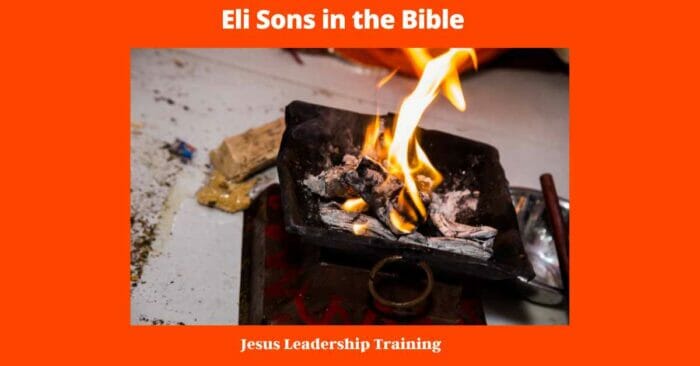
Although Eli knew that God was going to judge him and his family, he still did not take action to change the situation. As a result, when God’s judgment fell, it was even more severe than Eli had anticipated. First, Eli’s two sons – Hophni and Phinehas – died in battle (1 Samuel 4:11).
Then, when news of the death of the ark of the covenant came to Eli, he fell over backward out of his chair and broke his neck (1 Samuel 4:18). Thus, Eli died having experienced great personal loss – the death of both his sons and grandchildren followed by his own death.
Eli was a man who was called by God to serve in a high position of authority. However, because he did not take action when he should have, he experienced great personal loss. We can learn from Eli’s example by being quick to act when we know that something is not right. When we see sin in our own lives or in the lives of others, we should take action immediately. By doing so, we can avoid experiencing the same kind of personal loss that Eli did.
Names of Eli’s sons in the Bible He had two sons, Hophni and Phinehas
The story of Eli and his sons is a tragic one, found in the book of 1 Samuel. Eli was a judge and priest over Israel during a time when the Philistines were constantly at war with them. His sons, on the other hand, were wicked men who took advantage of their positions and coveted rewards that did not belong to them. Eventually, God’s patience with Eli and his sons ran out, leading to their demise. But what can we learn from their story? Let’s take a look at three Sons of Eli and the lessons we can glean from each of them.
Hophni and Phinehas
The first two sons of Eli were Hophni and Phinehas. These brothers were wicked men who had no regard for God or His laws. They abused their positions as priests by sleeping with the women who served at the tabernacle and taking meat for themselves that was meant for sacrificial offerings. In short, they did whatever they wanted without consequence.
But eventually, their actions caught up with them. God spoke to Eli about his sons’ wickedness, warning him that He would judge his house harshly because of it. And true to His word, not long after, both Hophni and Phinehas died in battle against the Philistines. This left Eli’s only remaining son, Samuel, to serve as priest in his stead.
What can we learn from Hophni and Phinehas? First and foremost, that sin always has consequences. No matter how long we think we can get away with something, eventually, our sin will find us out. Second, we see that even when those consequences are severe—as they were for Hophni and Phinehas—God is still merciful. He warns us ahead of time so that we might repent and avoid His judgment altogether.
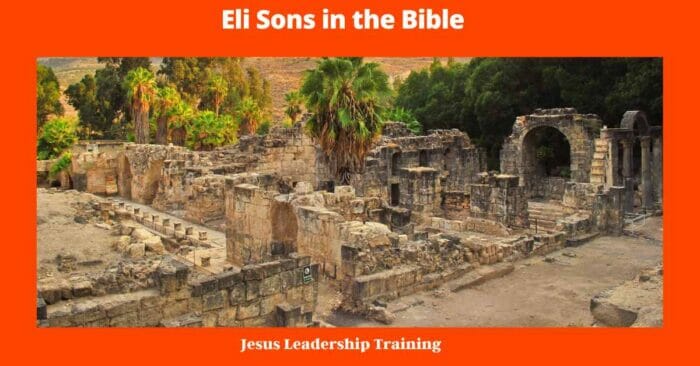
Samuel – How did Samuel End up in the Care of Eli the Priest
Unlike Eli two Biological sons, Samuel was a man who strived to please God in all he did. As a result, God blessed him greatly; he was given the ability to prophesy and became one of Israel’s most renowned prophets. In fact, it was through Samuel that God provided Israel with its first king, Saul.
The story of Samuel begins in 1 Samuel 1:1-20. Here we are introduced to Hannah, a woman who is unable to have children. In those days, it was a disgrace to be unable to have children because it was seen as a sign that you were not favored by God. Hannah was so distraught over her situation that she went to the Temple and prayed for a son.
Her prayer was overheard by the priest Eli, who misinterpreted it and thought she was drunk. When he scolded her, she explained her situation and how she had been praying for a son. Eli blessed her and sent her on her way. True to her word, Hannah became pregnant and had a son whom she named Samuel. When Samuel was weaned, she took him to the Temple to live with Eli.
It’s interesting to note that Hannah dedicated Samuel to the Lord before he was even born (1 Samuel 1:11). This was not unusual; in those days, it was common for parents to dedicate their firstborn sons to serve in the Temple.
However, what was unusual was that Hannah made a vow that if God granted her request, she would give her son back to God for service in the temple (1 Samuel 1:22). Most parents Dedicated their sons but then kept them with them. Not Hannah; she was willing to fully give her son over to God’s service.
As a result of her faithfulness, God blessed Hannah with five more sons and two daughters (1 Samuel 2:21). And Samuel grew up in the temple serving Eli and learning from him (1 Samuel 3:1).
Any parent who has given their child over to full-time ministry knows how difficult it can be at times. But like Hannah, we need to trust that God is ultimately in control and that He will take care of our children just as He took care of Samuel.
The story of Hannah and Samuel is a great reminder of the faithfulness of God and His provision for His people. It also shows us that when we are willing to give our children over to God’s service, He is faithful to bless us in return.
What Was Hophni and Phinehas’ relationship with the Ark of the Covenant
They were supposed to be ministering to the Lord at the Tabernacle, but instead, they were sinning against the Lord by abusing their positions. The Lord was very angry with them, and He was going to judge them for their sins.
One of the things that Hophni and Phinehas did was to take the Ark of the Covenant into battle with them, even though they had been told by God not to do this.
The result was that they were defeated by the Philistines and the Ark was captured. This caused great consternation among the people of Israel because they thought that the Ark was what made God powerful and that without it they would be defenseless.
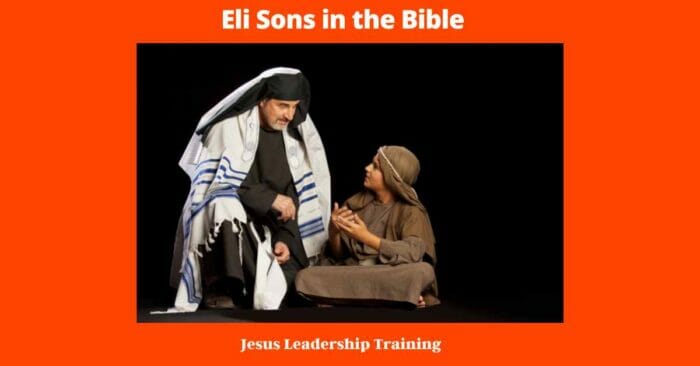
The Sin of Hophni and Phinehas
Hophni and Phinehas did not just touch the Ark of the Covenant, they actually took it into battle with them! This was a direct disobedience of what God had told them, which was that they were not to touch it or even look at it (1 Samuel 6:19). So why did they do this? We can only speculate, but perhaps they thought that by having the Ark with them in battle, it would make them invincible.
Unfortunately, as we know from reading the story, this was not the case. In fact, quite the opposite happened! The Philistines defeated Israel in battle and captured Ark.
When Eli heard about this he fell over and died because he knew that it meant judgment from God for his sons’ disobedience (1 Samuel 4:18). And he was right; not long after this both Hophni and Phinehas died, along with Eli’s wife who had given birth to them (1 Samuel 4:19-22). So we see that there were dire consequences for their disobedience.
We learn from Hophni and Phinehas’ story that we must be careful to obey what God has told us. He knows what is best for us, even if we may not always understand His ways. Sometimes He will allow us to experience difficult things in order to teach us lessons that we need to learn. But if we are obedient to Him, we can trust that He will always be with us and will work everything out for our good (Romans 8:28).
How did Eli Die
The Bible tells us that Eli was a good man, but he made some big mistakes. One of those mistakes was not correcting his sons when they did wrong. Eventually, God allowed Eli and his sons to die because of their disobedience. Let’s take a look at the story and see what we can learn from it.
The story of Eli begins in 1 Samuel 2. Eli was a priest who served at the tabernacle in Shiloh. He had two sons, Hophni and Phinehas, who were also priests. Unfortunately, Eli’s sons were wicked men. They would often steal meat from the sacrifices that were meant for God. They would also sleep with the women who served at the tabernacle.
Eli knew that his sons were doing wrong, but he didn’t correct them or discipline them. Eventually, God became fed up with Eli and his sons. In 1 Samuel 3:11-14, we read: “The LORD said to Samuel: ‘I am about to do a shocking thing in Israel. I will carry out all my threats against Eli and his family, from beginning to end.
I have warned him repeatedly that I am going to judge his family forever because of the sin he knows about–his sons are making themselves contemptible by doing evil in my presence and by sinning against me.'”

true to His word, God sent a prophet to tell Eli that He was going to judge his family. The next day, the Philistines attacked the Israelites and killed 30,000 Israelite soldiers. Hophni and Phinehas were among the casualties. When Eli heard about the deaths of his sons and the defeat of the Israelites, he fell over backward off his chair, broke his neck, and died (1 Samuel 4:18).
Lessons from the story of Eli and his sons
Although Eli’s story ends tragically, there are some important lessons we can learn from it.
First, we see that God is just. He warned Eli that his sons would die because of their wickedness, and they did. We may not always understand why bad things happen to good people, but we can trust that God is just and will deal with us according to His righteousness.
Secondly, we see the importance of discipline. If Eli had disciplined his sons when they first started sinning, things might have turned out differently for them—and for him. But because he failed to do so, they continued in their wicked ways and brought destruction to themselves and their family.
As parents, it’s our responsibility to train up our children in the way they should go (Proverbs 22:6). Part of that training is disciplining them when they disobey so that they will learn to obey God instead of following their own sinful desires.
Lastly, we see that sin has consequences—both in this life and the next. Hophni and Phinehas sinned against God by committing sexual immorality and taking advantage of people, and they reaped what they sowed—death. But not just physical death; spiritual death as well. Because they died without repenting of their sins, they are now suffering in eternity apart from God’s presence. That’s why it’s so important that we warn people about the consequences of sin and urge them to repent while there is still time.
Is there a Book of Eli in the Bible
There is no book in the Bible called “The Book of Eli.” However, there are two books in the Old Testament that are sometimes referred to as the “books of Elias” or “Elijah.” These books are 1 Kings and 2 Kings, which were originally one book. In 1 Kings, Elijah is taken up into heaven by a whirlwind, and Elisha becomes his successor.
In 2 Kings, Elisha performs many miracles, including raising a boy from the dead. These two books tell the story of God’s prophets during a time of great turmoil in Israel. Although there is no Book of Eli in the Bible, the books of Elias (1 and 2 Kings) offer a powerful testimony to God’s faithfulness and power.
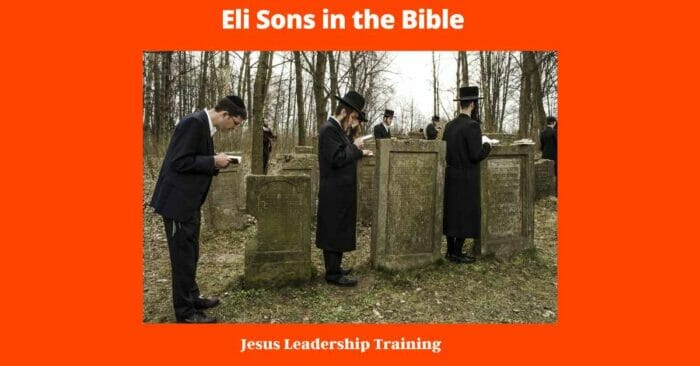
7 Steps to avoid Eli’s Failure with his Sons, Hophni and Phinehas
1. Do not neglect your relationship with God.
The first step to avoiding Eli’s failure with his sons is to make sure that you do not neglect your relationship with God. It is crucial to have a strong foundation in your faith in order to avoid the same mistakes that Eli made. Make sure to spend time reading your Bible, praying, and attending church regularly.
2. Teach your children about God early on.
Another important step is to make sure that you teach your children about God early on. It is important that they understand the importance of having a relationship with Him. Try to instill biblical values in them from a young age so that they can grow up to be godly adults.
3. Set a good example for your children.
In addition to teaching your children about God, it is also important that you set a good example for them. Children are often influenced more by what they see than what they are told. So make sure that you are living a life that reflects your faith.
4. Be involved in your children’s lives.
Another key step is to be involved in your children’s lives. Take an interest in their hobbies and activities and get to know their friends. This will help you to better understand them and guide them through their teenage years.
5. Communicate with your children openly and honestly.
It is also important that you communicate with your children openly and honestly. Talk to them about the things going on in their lives and let them know that they can come to you with anything they’re struggling with. This will help to build trust between you and them.
6. Pray for your children regularly.
Last but not least, make sure to pray for your children regularly. A prayer is a powerful tool that can help you protect and guide them through their teenage years and beyond.
7. Discipline your children when necessary.
Finally, remember to discipline your children when necessary. Part of that training is disciplining them when they disobey so that they will learn to obey God instead of following their own sinful desires. This will help to set a good foundation for them as they grow up and make sure they are learning the importance of being obedient to God.
Final Thoughts – Eli Sons in the Bible
By following these steps, you can ensure that you do not make the same mistakes as Eli and his sons. Making sure to stay close to God and love your children is key in raising godly children who will follow Him faithfully throughout their lives. As always, prayer is also essential in this process. By praying for your children, you can ask God to help protect and guide them, and He will answer those prayers. So remember to stay close to God and pray for your family, and you can avoid the same mistakes that led Eli’s sons down a path of destruction.
God Bless Greg



